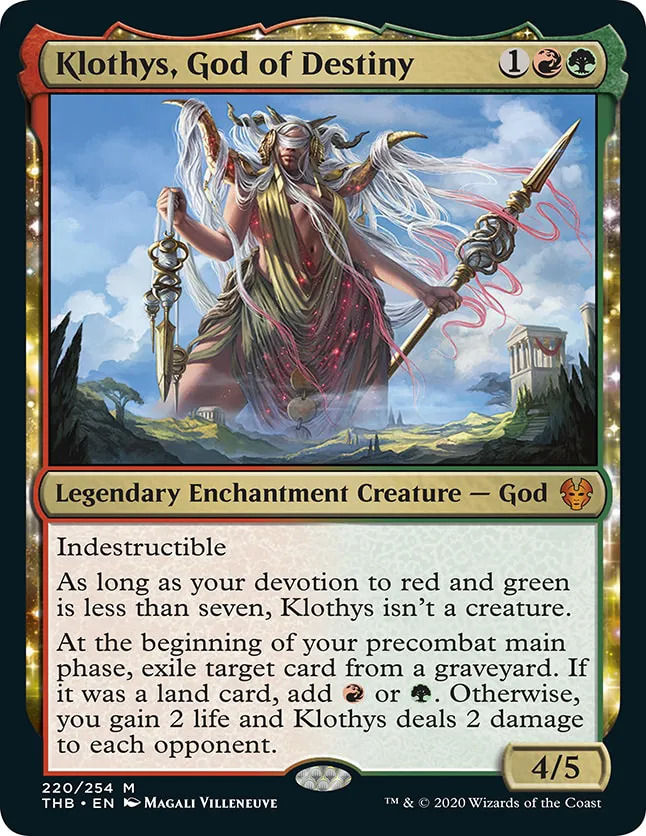Magic: The Gathering - The Role of Gods and Deities
- PD07256
- Jul 7, 2025
- 3 min read
Magic: The Gathering (MTG) is a game rich in lore, drawing its inspiration from a range of fantasy traditions and mythologies. Among some of the most fascinating elements to the game are its gods and deities which help to shape the worlds within the game. These divine beings play an important role in the storytelling, thematic depth and mechanics of the game.
Many of the different planes feature these powerful beings, although their influence and nature does vary greatly.
Let’s take a look at how gods shape the societies, cultures and even the very fabric of each plane.

Gods as mythological inspirations
The Magic gods are heavily influenced by characters in real-world mythologies, with a particular influence from Egyptian, Greek and Norse traditions. Take the Theros block for example, this mirrors Greek mythology, and features a pantheon of gods who have the ability to grant powers based around devotion. In a similar way, Amonkhet, a plane ruled by the God-Pharaoh Nicol Bolas, draws its influences from Egyptian mythology. They embody aspects of life, death and trials with the gods overseeing everything and preparing the worldly for the afterlife.
Pantheons across different planes
Every Magic plane has its own very unique interpretation of the gods and deities:
Theros
This plane is deeply intertwined with its gods. They dwell in Nyx, a starry realm filled with dreams which has a direct influence on the mortal world. The plane, which takes its influence from Hellenic Greece, features a pantheon with both minor and major gods each one representing a different aspect of existence.
Amonkhet
This plane is based clearly on ancient Egypt. Here the gods are active participants in all mortal affairs. They oversee trials and guide warriors.
Dominaria
Possibly the most well-known plane in the game, and where you will find most of MTG’s early history, this plane isn't overly ruled by its gods, there are powerful entities and legendary figures that can often take on the mantle of a god-like status or even wield immense, divine power.
Kaldheim
Inspired by Norse mythology, the gods of this plane are more warrior-like in character. They are deeply tied to the fate of the realm itself.
Gameplay mechanics of the Gods
The gods in MTG are quite often designed with a rather unique mechanics that reflects their divine nature, such as:
Indestructibility – Many of the gods, particularly those from Theros, are indestructible. This makes it incredibly difficult to remove them from the game.
Devotion – The gods of Theros need a particular level of devotion (mana symbols of their colour) to become creatures.
Conditional abilities – The gods from Amonkhet have a good range of abilities which can be activated under specific conditions. These help reinforce their thematic roles.
The influence of the gods within the game
The god cards in MTG are a powerful addition to any deck. They are often used to shape strategies around their abilities.
With a control deck, those gods who have indestructibility are fantastic for control strategies because they remain on the battlefield, offering ongoing effects. With an aggro deck, some of the gods are great for enhancing aggressive playstyles. They do this by either providing direct damage or by boosting creatures. Finally, in a combo deck, there are some gods that interact with specific mechanics. This allows for some unique combos that have the ability to dominate matches.
The evolution of gods and deities
With every extension, Magic introduces new gods to the game, and they are all adapted in their mechanics to fit an evolving gameplay style.
The gods and deities featured in Magic: The Gathering are more than simply powerful cards. They are integral characters to its mechanics, game lore and strategic depth. Whether the inspiration comes from mythology or from more original fantasy concepts, these divine beings add an important sense of richness to the Magic universe. This ensures that each set offers a unique experience for its players. As the game continues to evolve, so will the role of gods. This will ensure they have a continuing impact on both gameplay and storytelling.
All Magic: The Gathering (MTG) card images and symbols © Wizards of the Coast




Comments